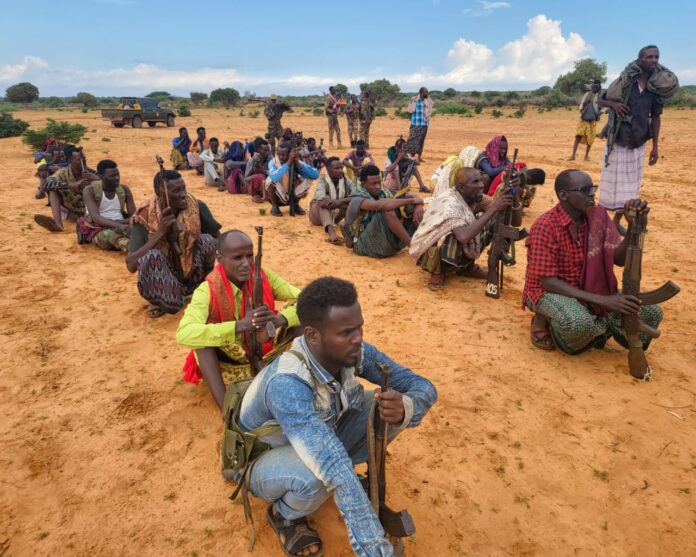MOGADISHU (KAAB TV) – A new report released by the Hiraal Institute, a non-governmental think tank based in Mogadishu, highlights the potential consequences of lifting the arms embargo on Somalia.
The report underscores the risks of further destabilization in the country and the unrestricted access to weapons and ammunition for armed militias and militant fighters.
The United Nations Security Council had voted in November of last year to maintain the arms embargo on Somalia, despite strong objections from the Somali government. The Security Council’s decision was based on the assessment that al-Shabab continues to pose a serious threat to peace and stability in the region, emphasizing the need for sanctions to degrade its activities.
Executive Summary
This report presents an in-depth examination of the potential consequences of lifting the arms embargo in Somalia. With a focus on both the national and international implications, our findings suggest caution and a nuanced approach towards this crucial policy…— Hiraal Institute (@HiraalInstitute) June 20, 2023
The arms embargo was initially imposed on Somalia in 1992 to stem the flow of weapons to feuding clan-based factions that had overthrown President Mohamed Siad Barre, plunging the nation into civil war. However, the weak and corrupt federal government in Mogadishu has been actively advocating for the lifting of the embargo, citing its inability to procure weapons to combat al-Shabaab.
The Hiraal Institute’s report raises concerns about the potential consequences of lifting the arms embargo, particularly regarding inter-clan conflicts. Since August 2022, the government has been promoting clan militias, and lifting the embargo could potentially trigger a volatile arms race among the clans, leading to heightened violence and increased instability.
The existence of open arms markets in Somalia further compounds the risks. The report points out that the ease of access to these markets could worsen with the lifting of the embargo, resulting in an upsurge of violence and instability. Moreover, it raises concerns about effective control and tracking of arms flow within the country.
Somalia’s intricate societal structure, characterized by deep-seated clan loyalties, presents a significant challenge in addressing these issues. The Somali National Army (SNA), primarily comprising clan militias, is currently embroiled in various clan-based conflicts across regions such as Lower Shabelle, Bakool, Puntland, and Gedo.
While the federal government is confined in Mogadishu and remains corrupt, clan-based conflicts are a recurrent feature in Somalia, often marked by violent confrontations involving small arms and anti-aircraft machine guns used by rival militias, which unfortunately lead to civilian casualties. These clan wars extend beyond internal disputes and have broader implications for Somalia’s security situation and regional stability.
Complicating matters further, the Somali government does not exercise full control over all its ports of entry. This situation heightens the risk of arms diversion to non-state actors, criminal syndicates, or potential adversaries due to the lack of comprehensive oversight.
“Without comprehensive oversight of these crucial trade nodes, the risk of arms being diverted to non-state actors, criminal syndicates, or potential adversaries is heightened,” the Hiraal Institute said.
Recent reports in local media have highlighted a troubling trend of weapons meant for the Somali army appearing in open markets, highlighting the challenges related to control and accountability. Building on these reports, the Hiraal Institute emphasizes that without robust mechanisms to secure and monitor weapons, prematurely lifting the arms embargo could lead to an increased proliferation of arms.
The report reveals that these arms bazaars cater not only to local militias or organized criminal syndicates but are accessible to anyone with sufficient financial means.
“The weapons sold in these markets range from small arms to antiaircraft cannons, all of which can significantly contribute to escalating violence and conflicts within and beyond Somalia’s borders,” the report finds.
Furthermore, the potential implications of unchecked arms flows extend beyond Somalia’s borders. The report stresses that historical lessons demonstrate how such flows can fuel conflicts, destabilize regions, and pose significant threats to international security. Considering these factors, a global perspective is crucial in shaping any decision concerning the future of the arms embargo.
The report authors conclude by emphasizing the need to prioritize strengthening Somalia’s capacity in arms control, securing ports of entry, and promoting effective governance before contemplating any significant changes to the current policy.


